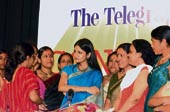 |
Every season, they come in hordes with their tank tops and spiked hair. They crowd the colleges, coffee shops and fast food joints, speaking The Language. It has a familiar ring to it, and if you pay attention, has a lot in common with a very old language the British left behind. Except you don?t understand all of it, just like the ghoti who feels at sea listening to Sylheti Bangla.
Welcome to the world of dudespeak. Which means that one doesn?t quote one?s father?s name when asked, ?Who?s your daddy?? That, pal, is totally eew. With a lot of totally other stuff that cannot be mentioned in print. A few episodes of Friends, and you might just hope to pronounce ?totally? right.
Americanisms in our speech are here to stay, and more and more young people are affected by it with every passing day. It?s common English, peppered with a few catchphrases that define ?cooldom?, with an accent that makes you wonder if you?re the only one that didn?t pick it up while walking past McDonald?s. Everything great is ?like, awesome, man?, everyone is a dude, and he ?so-- has to get another tattoo?.
So while the Seventies? Indian kid might have been feeling a great sense of accomplishment at having learnt how to say ?cool? when expressing approval 20 years too late (the word is essentially a post-WWII term, says a Merriam Webster book on American slang, owing to the calmness of life during the Fifties), his millennium counterpart has no such time to waste. Language from the United States filters down in a matter of minutes, and takes the with-it young men and women even less time to master. Not just that, the words change every season, just like fashion. They?re not necessarily new, just being used a lot. Like Bill Clinton caused everyone to use ?inappropriate? in every second sentence.
Dude may have been around since the Nineties, and even attained some sort of high-brow credibility with Michael Moore?s Dude, Where?s My Country?, but consider another immensely popular expression these days: ?Who?s your daddy?? It?s been there for a long, long time. In early 20th-century New York, daddy would usually mean pimp for prostitutes, and gang-leader for gangsters. And then, like all such expressions, it survived in anonymity for decades. Until the 30th of September this year, when a famous Red Sox baseball pitcher called his Yankees rival his ?daddy? and tipped his cap to him after a losing a game to the latter.
All of baseball-crazy America might have been seriously affected by the news, especially Yankees fans, who?ve been asking the Red Soxers non-stop since who their fathers are. But what about us? You spot too many T-shirts with the expression at college campuses, and MTV India has a very fuddy-duddy gentleman asking, ?Who ij eor deddy?? every half an hour. And this, despite Indians not knowing or caring whether Red Sox is a sports club or footwear for communists.
And thus, an inane expression finds its way into the teens? regular vocabulary in India lightning fast. Years ago, when life was simpler and journeys to and from other countries infrequent, a rare visit from cousins who lived abroad was one of the few ways to replenish our Americanese, hence the 20-year delay in ?cool? being finally popular in India. Hollywood movies were few and far between. And one couldn?t really imagine Audrey Hepburn calling Gregory Peck a cool dude in Roman Holiday. In the Enid Blytonish books our parents allowed us to read, ?swell? was the closest one came to a swearword. Until a few years ago, the Indians remained catchphrase-retards.
Even cable television failed to bring about a phrase revolution that we all anticipated and feared. In fact, Indian viewers seemed more resistant to the American way of life than we had thought. They made television companies rethink, and change their entire original content. Channels like Star Plus and MTV did a volte face, and concentrated more on saas-bahu and Bollywood. Despite Santa Barbara and Oprah, as far as the educated Indian was concerned, there was a general disdain for anything out-and-out American. After all, the Yanks pronounced vase as ?vaese?, didn?t use the ?u? when spelling colour, ate food which was junk, and called it that.
Liberalisation of the Indian economy made a chink in the armour, and Mc-prefixed burgers were no more the grub we read about in racy American paperbacks. Outsourcing seems to have conquered us completely. Now, in the land where call-centre workers are more equal than the rest of us, the former work on their fake American accent, answer to fake American names, and academically follow the phrases in all-American serials and films. And then, they get paid to do all that. So despite the identity crisis and the night shifts, being Americanised is considered not all that bad, especially if you?re hitting pay-dirt.
?When we joined, we were given a list of about 25 phrases to learn that our callers might use,? says Arvinder Kaur, who works at a call centre in Gurgaon. Not just that, she and her batchmates were given extensive lessons on the demographic details of the US and taught how to pronounce every word the Yankee way. The result: her voice, involuntarily, sports an accent. It?s little wonder that ? in an age when being the in-crowd is everything ? other, non-call-centre youngsters, have picked it up as well.
Arvinder, however, says she didn?t realise it?s American English she?s been speaking. ?They told us they were teaching us global English,? she counters. That could be one way of putting it, for America, clearly, means the world to us now.










